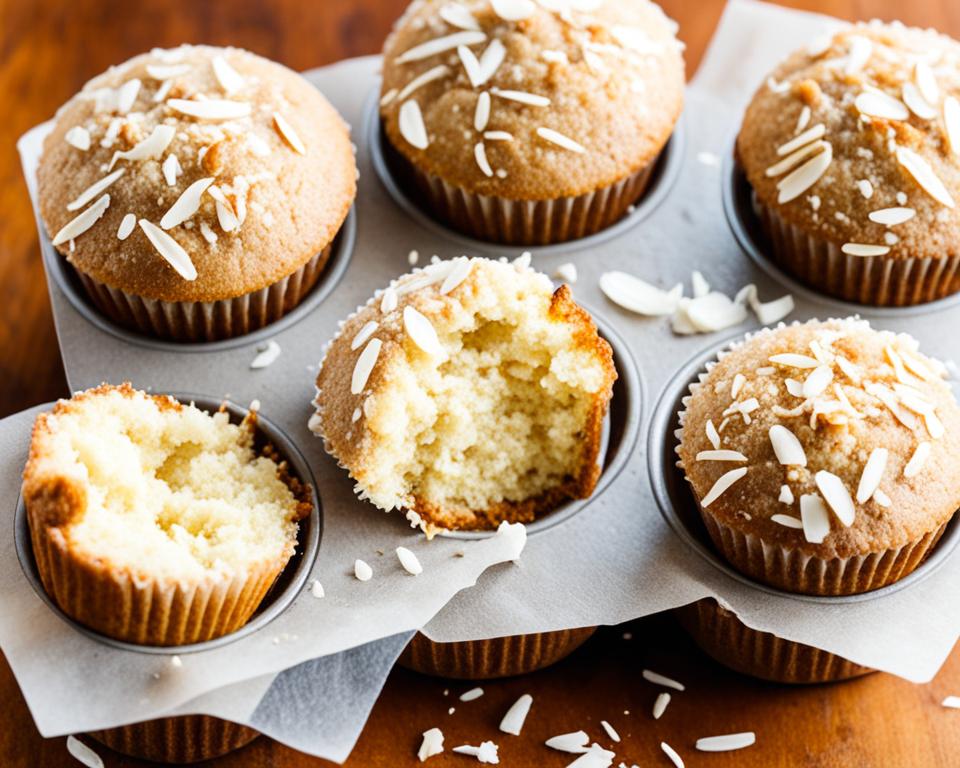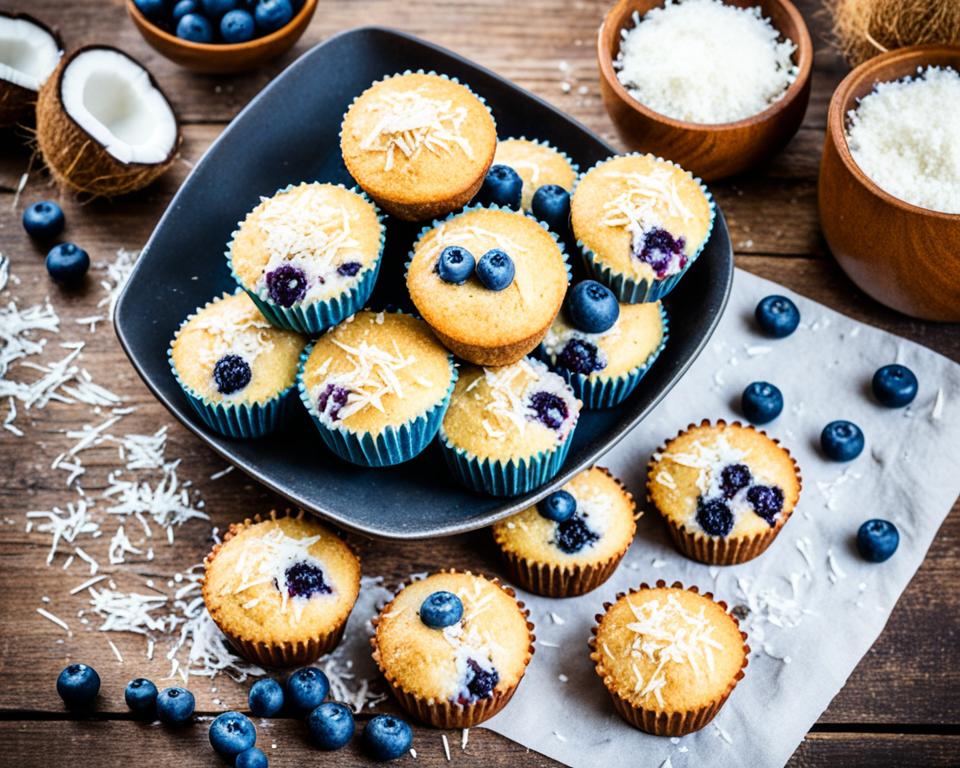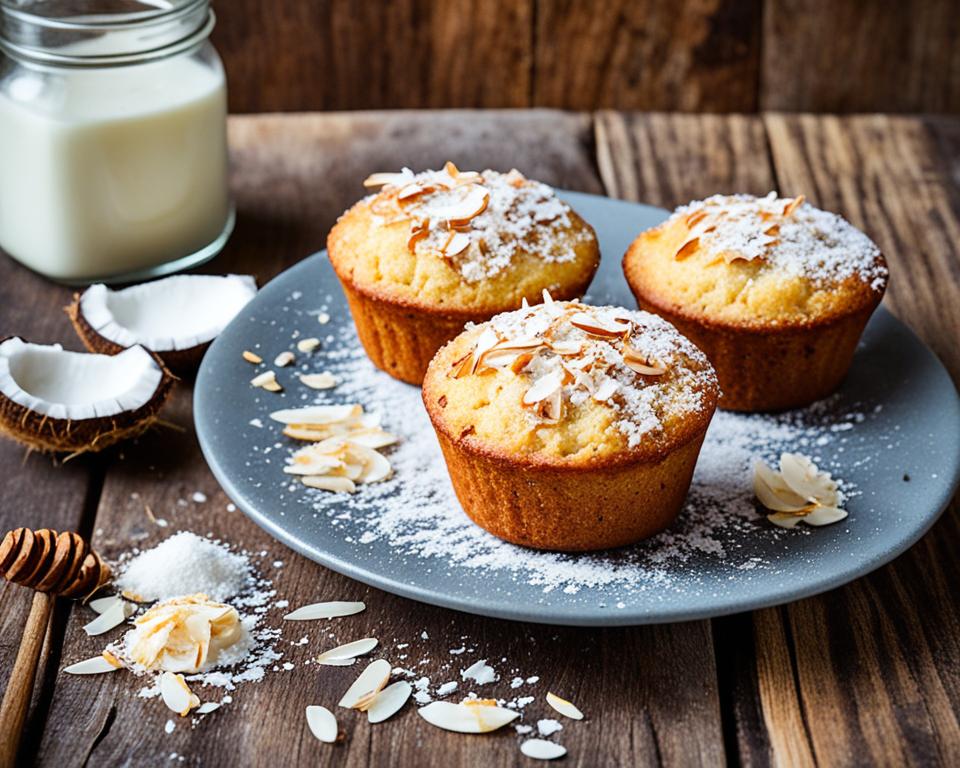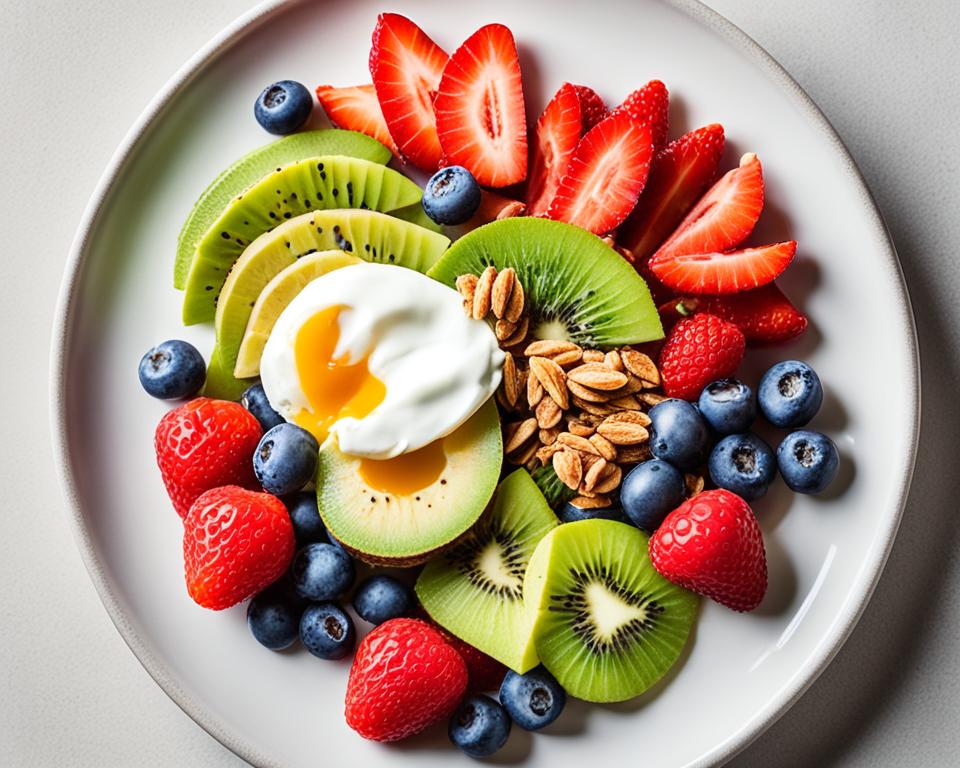Are you looking for a tasty and healthy treat that is gluten-free, low-carb, and paleo-friendly? Look no further than coconut flour muffins! These delightful muffins are a delicious alternative to traditional muffins and can be enjoyed by anyone, especially those with dietary restrictions.
Made with coconut flour, these muffins are not only gluten-free but also grain-free. They are packed with protein and fiber, making them a nutritious choice for breakfast or a snack. Whether you’re following a low-carb or paleo diet, coconut flour muffins are a perfect addition to your meal plan.
With their tender and moist texture, coconut flour muffins are sure to satisfy your cravings while providing you with a healthy treat. They can be easily made dairy-free, allowing you to enjoy them without any worries. Plus, their versatility makes them a great option for easy breakfast ideas or healthy snacks on the go.
Key Takeaways:
- Coconut flour muffins are delicious, gluten-free treats that are perfect for those with dietary restrictions.
- Made with coconut flour, these muffins are grain-free and packed with protein and fiber.
- Coconut flour muffins can be easily made dairy-free and are suitable for low-carb and paleo diets.
- These muffins have a tender and moist texture, making them a satisfying and nutritious option for breakfast or a snack.
- Enjoy coconut flour muffins as an easy breakfast idea or as a healthy snack on the go.
Why You Should Add Coconut Flour to Your Pantry
Coconut flour is a versatile and nutritious ingredient that should be a staple in your pantry. It offers a wide array of health benefits and is a great choice for those following a gluten-free, grain-free, or low-carb diet. With its high protein and fiber content, coconut flour is a filling and satisfying option for baking and cooking.
One popular brand of coconut flour is Bob’s Red Mill, known for its commitment to quality and sourcing of ingredients. Made from finely ground coconut meat, Bob’s Red Mill coconut flour is a top pick among health-conscious individuals and culinary experts alike. It’s a trusted brand that ensures you’re using the best possible ingredient for your recipes.
Coconut flour’s unique properties make it excellent for gluten-free baking, as it helps create moist and tender baked goods. Its high fiber content aids digestion and promotes a healthy gut. Additionally, coconut flour is low in carbohydrates, making it a suitable choice for those watching their carb intake or following a low-carb or keto diet.
By incorporating coconut flour into your pantry, you open up a world of possibilities for delicious and healthy baked goods. Whether you’re making coconut flour muffins, pancakes, cookies, or bread, this nutritious flour adds a delightful flavor and texture to your culinary creations.
To further showcase the benefits of coconut flour, here are some key features:
- Gluten-free: Coconut flour is naturally gluten-free, making it an excellent choice for individuals with gluten sensitivity or celiac disease.
- Grain-free: Unlike traditional flours, coconut flour is grain-free, which is ideal for those following a paleo or grain-free diet.
- High protein: Coconut flour is rich in protein, providing a boost of energy and supporting muscle repair and growth.
- High fiber: With its impressive fiber content, coconut flour promotes healthy digestion, aids in weight management, and helps regulate blood sugar levels.
To help you visualize the benefits of coconut flour, here is a simple yet informative table comparing coconut flour to other popular flours:
| Coconut Flour | Almond Flour | Rice Flour | |
|---|---|---|---|
| Gluten-free | ✓ | ✓ | |
| Grain-free | ✓ | ✓ | |
| Low-carb | ✓ | ✓ | |
| High protein | ✓ | ✓ | |
| High fiber | ✓ |
As you can see, coconut flour stands out as a healthier alternative, offering a range of desirable qualities for gluten-free and low-carb baking.
Whether you’re a seasoned baker or just starting your foray into the world of healthy cooking, adding coconut flour to your pantry is a wise choice. It allows you to expand your culinary horizons, experiment with new recipes, and enjoy the numerous health benefits of this remarkable ingredient.
The Unique Properties of Coconut Flour
Coconut flour is unlike any other flour due to its unique properties. One of its notable characteristics is its exceptional ability to absorb moisture. This moisture absorption quality can pose a challenge when substituting coconut flour in recipes that traditionally call for other types of flour.
To achieve the best results when working with coconut flour, it is advisable to rely on recipes specifically designed for this particular ingredient. These recipes have been carefully crafted to work harmoniously with the distinct properties of coconut flour. The ratios and ingredients in these recipes are optimized to produce delicious and successful outcomes.
In coconut flour recipes, the dryness of the flour is offset by using a higher quantity of eggs. The eggs not only add moisture but also aid in the rising process of the baked goods. Therefore, it is crucial to follow coconut flour recipes closely to achieve the desired texture and flavor.

How to Make Coconut Flour Muffins
Making delicious and healthy coconut flour muffins is a breeze with this easy recipe. Whether you’re following a gluten-free diet or simply looking for a nutritious treat, these muffins are sure to satisfy your cravings. With the added goodness of mashed banana and the option to make them dairy-free, these muffins are a versatile and guilt-free choice.
To make coconut flour muffins, gather these easy pantry staples:
- 1/4 cup coconut oil
- 1/2 cup coconut flour
- 1 teaspoon baking powder
- 1/4 teaspoon salt
- 1/2 cup mashed banana
- 4 eggs
- 2 tablespoons honey or maple syrup
- 1 teaspoon vanilla extract
- 1/2 cup blueberries or other mix-ins
Follow these simple baking directions:
- Preheat your oven to 400 degrees Fahrenheit.
- In a mixing bowl, combine the coconut oil, coconut flour, baking powder, salt, mashed banana, eggs, honey or maple syrup, and vanilla extract. Whisk the ingredients until smooth.
- Fold in blueberries or any other mix-ins of your choice.
- Scoop the batter into muffin cups, filling each one about three-quarters full.
- Bake for 16 to 18 minutes, or until a toothpick inserted into the center comes out clean.
- Allow the muffins to cool in the pan for 5 minutes before transferring them to a wire rack to cool completely.
If you prefer a dairy-free option, simply substitute coconut oil for butter in the recipe. This modification adds a hint of coconut flavor and ensures that everyone can enjoy these tasty treats.
Make-Ahead Tips: These coconut flour muffins can be made in advance to save time during busy mornings. Refrigerate them in an airtight container for up to a week or freeze them individually wrapped in plastic wrap and stored in a freezer-safe container for up to 3 months.
Storage Tips: Store your coconut flour muffins in the refrigerator to keep them fresh and moist. They will stay delicious for up to a week. When you’re ready to enjoy them, simply reheat them in the microwave at 50% power for about 10 seconds per muffin until warmed through.

Get creative with these delicious add-ins:
Elevate your coconut flour muffins by experimenting with different mix-ins and flavors. Try adding chocolate chips, diced strawberries, or shredded coconut for extra indulgence. You can also enhance the flavor profile by incorporating orange zest, lemon zest, or spices such as cinnamon or nutmeg. The possibilities are endless, so have fun and customize your muffins to suit your taste preferences.
Substituting Coconut Flour in Recipes
Coconut flour is not a direct substitute for other flours in recipes. It possesses unique properties that require adjustments and adaptations when baking. Understanding these properties and using recipes specifically designed for coconut flour is essential for achieving desirable results.
Coconut flour is known for its ability to absorb moisture and its inherently dry texture, making it unsuitable as a one-to-one replacement for other flours. When substituting coconut flour in a recipe, it is crucial to consider its moisture absorption properties and adjust the liquid content accordingly.
Coconut flour should not be substituted in recipes that rely heavily on the binding and structural properties of other flours, such as wheat flour or almond flour.
To successfully bake with coconut flour, it is best to use recipes that have been specifically formulated to work with its unique characteristics. These recipes strike the right balance of ingredients and ratios to account for coconut flour’s absorbency and dryness, resulting in moist and flavorful baked goods.
When experimenting with your own recipe adaptations, keep in mind that coconut flour typically requires a higher number of eggs to provide moisture and structure. Eggs help bind the ingredients together and bring moisture to the batter, ensuring a moist and well-risen final product.
For optimal texture and flavor, it is recommended to follow coconut flour recipes closely and avoid substituting it for other flours in traditional recipes without proper adjustments.
Remember, successful baking with coconut flour requires an understanding of its unique properties and the use of tried and tested recipes. By following coconut flour recipes or adapting them with the necessary adjustments, you can enjoy delicious and healthy baked goods that showcase the unique qualities of this versatile ingredient.
The Benefits of Coconut Flour
Coconut flour offers numerous health benefits that make it a popular choice for gluten-free, grain-free, and low-carb baking. It is naturally gluten-free and grain-free, making it a suitable option for those with dietary restrictions.
One of the key advantages of coconut flour is its high protein and fiber content. It is packed with nutrients that can help promote feelings of fullness and support a healthy digestive system.
In addition, coconut flour is low in carbohydrates, making it an ideal choice for those following a low-carb or keto diet. Its low-carb nature allows you to enjoy delicious treats without derailing your dietary goals.
By incorporating coconut flour into your baking, you can create a wide range of dishes that are not only flavorful but also nutrient-dense. It adds a unique taste and texture to recipes, making it a versatile ingredient.
If you’re looking for an alternative to traditional flours, coconut flour is an excellent choice. Its health benefits, including being high in protein, fiber, and low in carbs, make it a favorite among health-conscious individuals.
Whether you’re looking to indulge in gluten-free baking or explore grain-free and low-carb options, coconut flour is a delicious and nutritious ingredient that can transform your favorite recipes.
Discover the numerous health benefits and culinary possibilities of coconut flour by incorporating it into your baking repertoire.
Discover the numerous health benefits and culinary possibilities of coconut flour by incorporating it into your baking repertoire.
Coconut Flour Muffins Variations
Coconut flour muffins offer endless possibilities for customization. With different mix-ins and flavors, you can create muffins that suit your taste preferences. Here are some popular variations that you can try:
- Chocolate Chip Muffins: Add a sweet twist to your coconut flour muffins by adding chocolate chips to the batter. The gooey melted chocolate inside the fluffy muffin is sure to satisfy your cravings for something indulgent.
- Blueberry Muffins: Bursting with fruity goodness, blueberry muffins are a classic choice. Fold fresh or frozen blueberries into the batter to create pockets of juicy sweetness in every bite.
- Lemon Zest Muffins: Add a zing to your muffins by incorporating lemon zest into the batter. The bright citrus flavor complements the coconut flour base and adds a refreshing twist to the traditional muffin.
Not only can you experiment with different flavors, but you can also add various mix-ins to your coconut flour muffins. Consider adding nuts, such as chopped almonds or walnuts, to add texture and a healthy dose of protein. For a delightful surprise, try filling the muffins with a cream cheese mixture that oozes out when you take a bite. This rich and creamy filling adds a decadent touch to your muffins.
If you want to take your coconut flour muffins to the next level, you can also add a dollop of icing on top. Drizzle a simple glaze made with powdered sugar and lemon juice or cream cheese frosting to add a finishing touch of sweetness.
Let your imagination run wild and create unique and delicious muffin variations using coconut flour as the base. The possibilities are limitless!
Storing Coconut Flour Muffins
After baking a batch of delicious coconut flour muffins, you may be wondering how to store them properly to maintain their freshness and flavor. Whether you want to enjoy them throughout the week or freeze them for future use, here are some tips on storing coconut flour muffins:
Refrigeration:
Coconut flour muffins can be stored in the refrigerator for up to a week. To prevent them from drying out, it is important to keep them in an airtight container or wrap each muffin individually in plastic wrap before refrigerating. This will help maintain their moisture and texture.
Freezing:
If you want to extend the shelf life of your coconut flour muffins, freezing is a great option. Individually wrap each muffin in plastic wrap and place them in a freezer-safe container or freezer bag. By keeping the muffins individually wrapped, you can easily thaw and enjoy them as needed without defrosting the whole batch.
Meal Prep and Make Ahead:
Coconut flour muffins are perfect for meal prep and make-ahead breakfasts. You can bake a batch on the weekend and have them ready to grab and go throughout the week. Simply follow the refrigeration or freezing instructions mentioned above to store them properly. This way, you’ll always have a nutritious and convenient breakfast option on hand.
To reheat your stored coconut flour muffins, simply place them in a microwave-safe dish or plate and microwave them at 50% power for about 10 seconds per muffin. This gentle reheating method will help prevent them from becoming tough or dry. Alternatively, you can let them thaw at room temperature or reheat them in a preheated oven at a low temperature for a few minutes.
By properly storing your coconut flour muffins, you can enjoy their delicious flavor and texture even days or weeks after baking. Whether refrigerating, freezing, or meal prepping, these storage methods ensure that you’ll have a convenient and wholesome treat ready whenever you want.
More Gluten-Free Muffin Recipes
If you enjoy baking with coconut flour, there are plenty of other delicious recipes you can try. In addition to coconut flour muffins, you can explore recipes for almond flour muffins, coconut flour pancakes, and coconut flour cake. These recipes are all gluten-free and provide a nutritious and tasty alternative to traditional baked goods. Adding coconut flour to your baking repertoire opens up a world of possibilities for healthy and delicious treats.
Almond Flour Muffins
If you’re looking for a nutty twist on your muffins, almond flour is a great option. It adds a rich flavor and moist texture to baked goods. Try these Almond Flour Blueberry Muffins:
| Ingredients | Instructions |
|---|---|
|
|
Coconut Flour Pancakes
Start your day off right with fluffy and flavorful coconut flour pancakes. They’re a delicious and healthy twist on a classic breakfast favorite. Try these Coconut Flour Pancakes:
| Ingredients | Instructions |
|---|---|
|
|
Coconut Flour Cake
Indulge in a delightful coconut-flavored cake that is moist, fluffy, and gluten-free. This Coconut Flour Cake recipe is perfect for birthdays or any special occasion:
| Ingredients | Instructions |
|---|---|
|
|
These recipes are just a taste of what you can create with coconut flour. Whether you’re in the mood for muffins, pancakes, or a cake, these gluten-free options are sure to satisfy your cravings. Get creative in the kitchen and enjoy the benefits of healthy coconut flour recipes.
Conclusion
Coconut flour muffins are not only incredibly delicious, but they also offer a range of health benefits, making them the perfect choice for those seeking healthy, gluten-free, and low-carb treats. These moist and tender muffins are a satisfying and nutritious option for breakfast or as a snack throughout the day. With coconut flour as the star ingredient, these muffins are packed with protein and fiber, ensuring you stay fueled and full for longer.
One of the great advantages of coconut flour is its versatility. It can be incorporated into a variety of recipes, from muffins to pancakes and even cakes, offering a wide range of gluten-free and paleo-friendly options. By choosing to include coconut flour in your baking, you can enjoy a varied and delicious selection of treats while staying true to your dietary needs and preferences.
Healthy baking has never been easier with coconut flour. Its high protein and fiber content, coupled with its low-carb nature, make it the perfect choice for those on a health-conscious journey. So why not add this incredible ingredient to your pantry and start creating your very own coconut flour muffins and other delightful recipes? You’ll be delighted by the flavors and satisfied by the health benefits they offer.
FAQ
Are coconut flour muffins gluten-free?
Yes, coconut flour muffins are gluten-free as coconut flour is naturally gluten-free.
Can I make dairy-free coconut flour muffins?
Yes, you can make dairy-free coconut flour muffins by using coconut oil instead of butter.
Can I substitute coconut flour in other recipes?
Coconut flour has unique properties and is not a direct substitute for other flours. It is best to use recipes specifically designed for coconut flour.
How should I store coconut flour muffins?
Coconut flour muffins can be stored in an airtight container in the refrigerator for up to a week or frozen for up to three months.
What are some popular variations of coconut flour muffins?
Popular variations include chocolate chip muffins, blueberry muffins, lemon zest muffins, and muffins with nuts or a cream cheese filling.
What are the health benefits of coconut flour?
Coconut flour is high in protein and fiber, gluten-free, grain-free, and low in carbohydrates.
Can I make coconut flour muffins ahead of time?
Yes, you can make coconut flour muffins ahead of time and store them in the refrigerator or freezer for future consumption.
Can I use coconut flour in other recipes?
Yes, coconut flour can be used in a variety of recipes, such as almond flour muffins, coconut flour pancakes, and coconut flour cake.
Are coconut flour muffins suitable for a paleo diet?
Yes, coconut flour muffins are paleo-friendly as they are grain-free and made with natural ingredients.
How do I make coconut flour muffins?
To make coconut flour muffins, combine coconut oil, coconut flour, baking powder, salt, mashed banana, eggs, honey or maple syrup, and vanilla extract. Add mix-ins like blueberries, then bake at 400 degrees Fahrenheit for 16 to 18 minutes.
What brand of coconut flour is recommended?
Bob’s Red Mill is a popular and high-quality brand of coconut flour.





